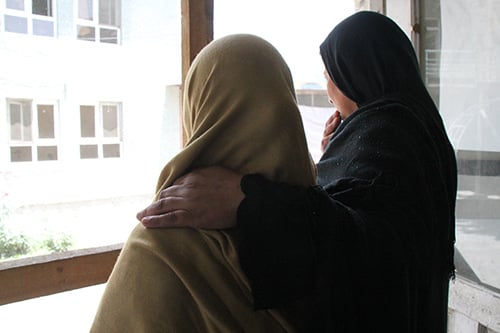KABUL, Afghanistan – “They told me that my mother had sold me to them,” Zarmina* said of her kidnappers, who snatched her from her home in Afghanistan when she was only 13, then forced her into sexual servitude.
Her ordeal began when she was home alone last year. A woman entered the home and took her by force.
Zarmina was taken to a bar in Kabul, where she was drugged and sexually abused. For the next two months, she would be moved from location to location, and abused constantly.
"I was moved to different places for two months and 18 days, until I was released," she said.
A mother’s fear
Zarmina’s mother recalled coming home to find her missing, “Her shoes were outside the door when I returned home, so I knew something had happened to her and went to the police.”
But the authorities were dismissive. “They laughed at me,” she said, crying. “They told me that she had probably run away with her boyfriend."
The family grew more distressed as the days wore on.
Finally, one of the customers at the Kabul bar helped Zarmina convince the kidnappers to sell her back to her mother.
"I received a call from the woman who kidnapped her," Zarmina’s mother explained. "She asked me for money to have her back.
“We agreed on a meeting point to do the exchange. We alerted the police, and they helped by arresting the woman and her brothers.”
Recovery
After she returned home, Zarmina sought assistance from the Family Protection Centre in Kabul, one of several such centres supported by UNFPA throughout Afghanistan. These facilities are located in hospitals, and staffed by trained professionals who offer psychological support, medical assistance, evidence collection and many other services.

Zarmina was at first reluctant to talk about her experience. “I thought they were going to make fun of me,” she said. “I was scared to tell my story because part of my family blamed me for what had happened.” “Survivors of gender-based violence are referred to the centre, where they can access several services in one place, such as psychosocial, medical and legal support,” said Abdul Basit, a UNFPA expert in addressing gender-based violence.
“When she first visited us she didn’t tell the whole story,” said Nabila Tasali, a legal advisor at the centre. “Visit by visit, she explained what had happened to her.”
The centre provided Zarmina with health and psychosocial support for a year. “She came here every day of the week,” says Ms. Tasali
Justice for Zarmina
Zarmina also used the centre’s legal services to bring her case to the prosecutor’s office.
Cases involving gender-based violence are notoriously difficult to prosecute. UNFPA has provided training and information to hundreds of judges and thousands of police recruits, aiming to strengthen the justice system's capacity to address violence against women and girls.
Zarmina's kidnapper was ultimately sentenced to five years in prison.
Unfortunately, other girls who had also been abducted were not recovered.
“I was with five more girls – one of them was pregnant – but they couldn’t find them,” said Zarmina.
Today, Zarmina is back in school. She says she likes her teachers and classmates. When asked what she wants to be when she grows up, she did not hesitate.
“I want to be a judge,” Zarmina said.
– Maria Blanco Lora
*Name changed to protect her identity

